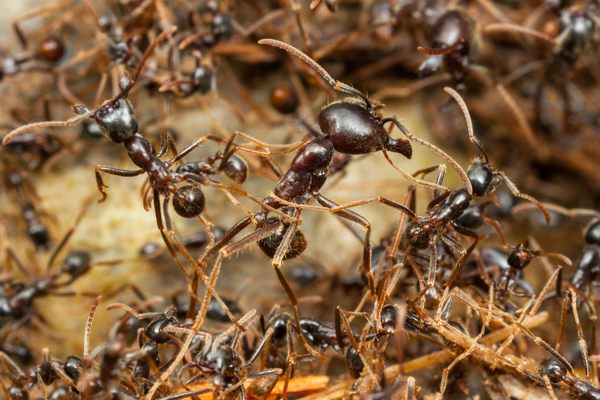So-Called Lazy Ants Are Good for Something, After All
Even shirkers have a place in the colony.

Everyone knows what ants are about. They’re no-nonsense little guys. They work all summer (holidays are for the weak) to save up for winter. They sleep when they’re dead. They soldier on, sometimes lifting up to 5,000 times their own weight, all for the good of the collective, out of instinct that can resemble duty and honor and obligation. They don’t mess around, ants.
Except, it turns out, some do—but maybe for a good reason. In 2015, biologists at the University of Arizona observed that quite a number of so-called “worker ants” spend most of their time, well, not working. “They really just sit there,” Daniel Charbonneau, a researcher at the university, said in a statement. They might chip in with chores—grooming or brood care, from time to time—but most of the time, they’re studious about doing nothing. In Temnothorax rugatulus colonies in the lab, Charbonneau found around 40 percent of the six-legged subjects were industriously inactive.
Somehow, Charbonneau and two fellow researchers were able to ascertain which 20 percent of ants in the colony were the hardest-working. Then they removed them. Once the cream had been skimmed off the top, the “lazy” upped their activity level to match that of their missing comrades. “This suggests that the colony responds to the loss of highly active workers by replacing them with inactive ones,” Charbonneau said, in a statement. By contrast, if the least active 20 percent get plucked out, they aren’t replaced. Those lazy ants aren’t really good-for-nothing—they’re good-for-back-up. It’s not hard to see how a single disaster could wipe out a colony’s best ants, Charbonneau said. “Since they can live for up to five years or more, they have to overwinter, and being snowed in claims many workers each season.”

Ant colonies may not be all that different from offices. You have your shirkers, you have the people wandering around trying to look busy. You have diligent types, “foragers,” who bring in snacks and sometimes bake cookies, and nurses, who “rear the brood” or keep Advil on hand. Charbonneau observed other parallels with modern workplaces. Companies keep stockpiles in warehouses to meet demand in times of crisis. They bring in temps from external agencies when staffing is low. Computer systems are backed up by reserve processing power.
But there are also some striking differences. Lazy ants are notable for their “distended abdomens,” which leads researchers to wonder whether they might also serve as “living pantries.” The corporate world may be dog-eat-dog, but things don’t seem to have gotten that bleak just yet.



















Follow us on Twitter to get the latest on the world's hidden wonders.
Like us on Facebook to get the latest on the world's hidden wonders.
Follow us on Twitter Like us on Facebook